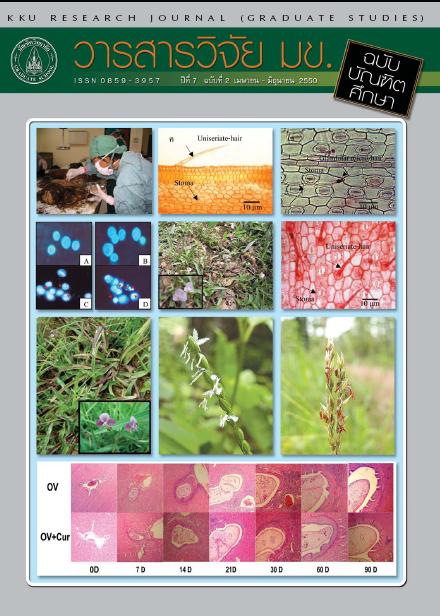Effects of Syzygium gratum on antioxidant system in β-thalassemia/Hb E patients(ผลของผักเม็กต่อระบบต้านออกซิเดชันในผู้ป่วยธาลัสซีเมีย ฮีโมโกลบินอี)
Keywords:
Thalassemia(โรคธาลัสซีเมีย), Syzygium gratum(ผักเม็ก), Antioxidant(สารต้านอนุมูลอิสระ)Abstract
Thalassemia is one of the genetic disorders, resulting from an abnormal hemoglobin synthesis. The red blood cells containing abnormal hemoglobin are destroyed and some of these thalassemia patients need regular blood transfusion that results in an increased accumulation of iron in the body. The presence of systemic iron overload will catalyze the generation of reactive oxygen species and leads to the oxidative stress and tissue injuries. Supplementation with antioxidant substances may be beneficial in attenuating the oxidative stress and minimizing organ dysfunction. The purpose of this work was to evaluate a feasibility study of the use of Syzygium gratum (SG) in β-thalassemia/HbE patients and adverse effects. Eleven blood transfusion-dependent thalassemia patients received SG water extract at dose of 0.1 g/kg body weigh/day, but total dose not more than 5 g, in divided twice daily dose for 7 days. Subjects were requested for recording the questionnaire regarding adverse events, and palatability. Blood samples were collected from subjects before and after the study. Blood samples were analyzed for complete blood count, liver function and kidney function tests, lipid peroxidation (MDA), glutathione (GSH), γ-glutamylcysteine ligase (GCL) activity, total antioxidant capacity by ferric reducing antioxidant power (FRAP) assay and vascular reactivity by forearm blood flow measurement. There was no report of any major side effects, no changes in CBC examination, liver and kidney function tests. GSH levels, GCL activity and vascular reactivity were unchanged upon the consumption of the SG extract. The total antioxidant capacity in the plasma as assessed by FRAP assay was 1032.8 ± 61.7 µEq and after supplementation, it was significantly increased to 1218.9 ± 77.8 µEq (P-value < 0.001). It was concluded that short term intake of SG extract enhances plasma antioxidant capacity and merits further study.
โรคธาลัสซีเมียเป็นโรคทางพันธุกรรม ที่มีความผิดปกติในการสังเคราะห์ฮีโมโกลบิน ทำให้เกิดภาวะเม็ดเลือดแดงแตก ผู้ป่วยเหล่านี้บางรายจำเป็นต้องได้รับการถ่ายเลือด ซึ่งเป็นผลตามมาทำให้ผู้ป่วยมีภาวะเหล็กเกิน ทำให้มีการสร้างอนุมูลอิสระของออกซิเจน นำไปสู่การเกิดภาวะเครียดออกซิเดชันและการบาดเจ็บของเนื้อเยื่อ การได้รับสารต้านออกซิเดชันอาจจะลดภาวะเครียดออกซิเดชันและลดความผิดปกติการทำงานของอวัยวะที่เกิดขึ้นได้
การศึกษานี้มีวัตถุประสงค์เพื่อศึกษาความเป็นไปได้ของการดื่มน้ำต้มผักเม็กในผู้ป่วยธาลัสซีเมียฮีโมโกลบินอีและประเมินผลข้างเคียงที่เกิดขึ้น ผู้ป่วยธาลัสซีเมียจำนวน 11 คนดื่มน้ำต้มผักเม็ก ในขนาดที่ให้ชงดื่ม 0.1 กรัมต่อกิโลกรัมน้ำหนักตัวต่อวัน แต่ไม่เกินวันละ 5 กรัม แบ่งชงดื่มวันละ 2 ครั้ง เป็นเวลา 7 วัน อาสาสมัครตอบแบบสอบถามเกี่ยวกับอาการข้างเคียงและความยอมรับการดื่มน้ำต้มผักเม็ก รับการเก็บตัวอย่างเลือดก่อนและหลังการศึกษาเพื่อประเมิน complete blood count, liver function and kidney function test, lipid peroxidation (MDA), glutathione (GSH), การทำงานของเอนไซม์ γ-glutamylcysteine ligase (GCL), total antioxidant capacity โดยการวัด ferric reducing antioxidant power (FRAP) assay และ vascular reactivity โดยการวัด forearm blood flow
ผลการศึกษาพบว่าผู้ป่วยธาลัสซีเมีย ไม่มีอาการข้างเคียงใดๆรุนแรงเกิดขึ้น และไม่มีความผิดปกติจากผลการตรวจทางห้องปฏิบัติการทั้งการตรวจ CBC , liver และ kidney function tests ส่วนระดับของ GSH, การทำงานของเอนไซม์ GCL และการทำงานของหลอดเลือดไม่มีการเปลี่ยนแปลงหลังจากบริโภคน้ำต้มผักเม็ก ระดับของ total antioxidant capacity ในพลาสมาซึ่งประเมินโดยวิธี FRAP มีค่าเท่ากับ 1032.8 ± 61.7 µEq และหลังจากดื่มน้ำต้มผักเม็ก มีค่าเพิ่มขึ้นอย่างมีนัยสำคัญทางสถิติเป็น 1218.9 ± 77.8 µEq (p-value < 0.001) การศึกษาสรุปว่าการดื่มน้ำต้มผักเม็กระยะสั้นนี้มีผลเพิ่ม antioxidant ในพลาสมาและงานนี้มีคุณค่าที่จะทำการศึกษาต่อไป



